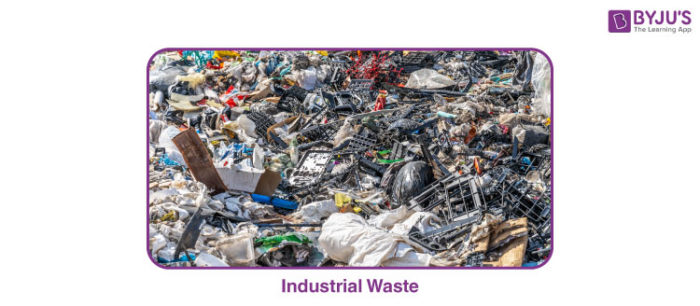What is Industrial Waste?
We have millions of factories, mills, industries, mining plants, etc. around the world. These industries use raw materials to produce finished goods for consumers. But in the manufacturing process, there are materials which are rendered useless.
They constitute the industrial waste. Some examples of industrial wastes are metals, paints, sandpaper, slag, ash, radioactive wastes, etc. In this article, we will discuss different types of industrial wastes and their disposal.

Types of Industrial Waste
Industrial waste can be categorised into biodegradable and non-biodegradable.
1. Biodegradable
Those industrial wastes which can be decomposed into the non-poisonous matter by the action of certain microorganisms are the biodegradable wastes. They are even comparable to house wastes. These kinds of waste are generated from food processing industries, dairy, textile mills, slaughterhouses, etc. Some examples are paper, leather, wool, animal bones, wheat, etc. They are not toxic in nature, and they do not require special treatment either. Their treatment processes include combustion, composting, gasification, bio-methanation, etc.
2. Non-biodegradable
Those industrial wastes which cannot be decomposed into non-poisonous substances are the non-biodegradable wastes. Examples are plastics, fly ash, synthetic fibres, gypsum, silver foil, glass objects, radioactive wastes, etc. They are generated by iron and steel plants, fertiliser industries, chemical, drugs, and dyes industries. It is estimated that about 10 to 15 percentage of the total industrial wastes are non-biodegradable and hazardous, and the rate of increase in this category of waste is only increasing every year. These wastes cannot be broken down easily and made less harmful.
Hence, they pollute the environment and cause threat to living organisms. They accumulate in the environment and enter the bodies of animals and plants causing diseases. However, with the advancement in technology, several disposals, and reuse methods have been developed. Wastes from one industry are being treated and utilised in another industry. For example, the cement industry uses the slag and fly ash generated as waste by steel industries. Landfill and incineration are other methods which are being resorted to, for the hazardous wastes.
Recommended Videos

Frequently Asked Questions – FAQs
What is industrial waste and give an example?
Industrial waste is characterised as waste generated by fabrication or industrial processes. Cafeteria refuse, dirt and gravel, masonry and mortar, scrap metals, gasoline, solvents, pesticides, weed grass and trees, wood and scrap lumber are examples of industrial waste.
What are the 5 types of waste?
Waste can be divided into five types of waste that are all generally found in the home. That includes liquid waste, solid garbage, industrial waste, radioactive waste and recyclable waste.
What are examples of domestic waste?
Examples include industrial solid waste (household waste / refuse), hazardous waste, wastewater (such as sewage containing human waste (faeces and urine) and soil run off), toxic waste, etc.
What does industrial waste mean?
Industrial solid waste is classified as waste from an industrial or manufacturing operation or waste generated from non-manufacturing activities that is handled as a separate waste stream by corporations.
How is industrial waste treated?
The techniques include automated refining of oxidation, distillation, adsorption, ozonation, vitrification, incineration, chemical immobilisation or disposal of landfills. Few products, such as some detergents, may be capable of biological deterioration and a different method of wastewater treatment must be used in such situations.
To learn more about industrial waste, their treatment, and disposal, download BYJU’S – The Learning App.

Comments